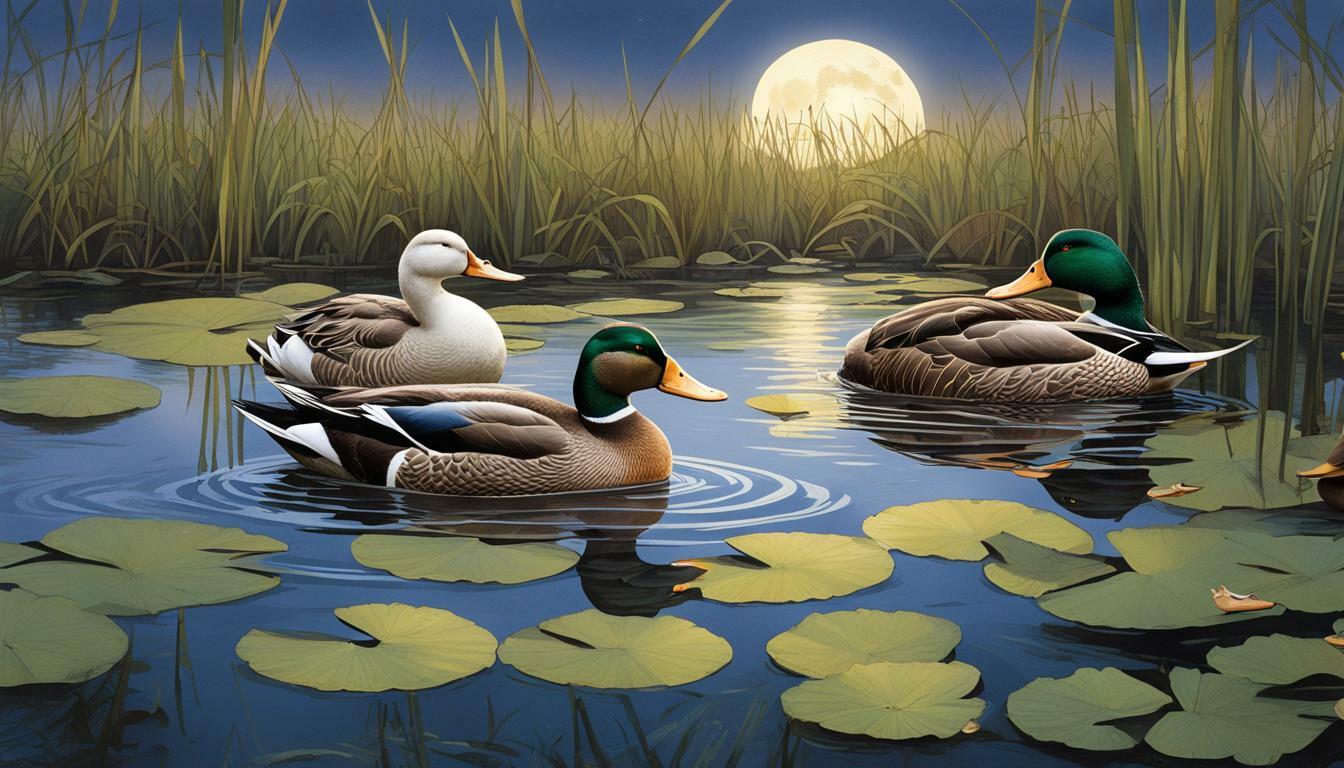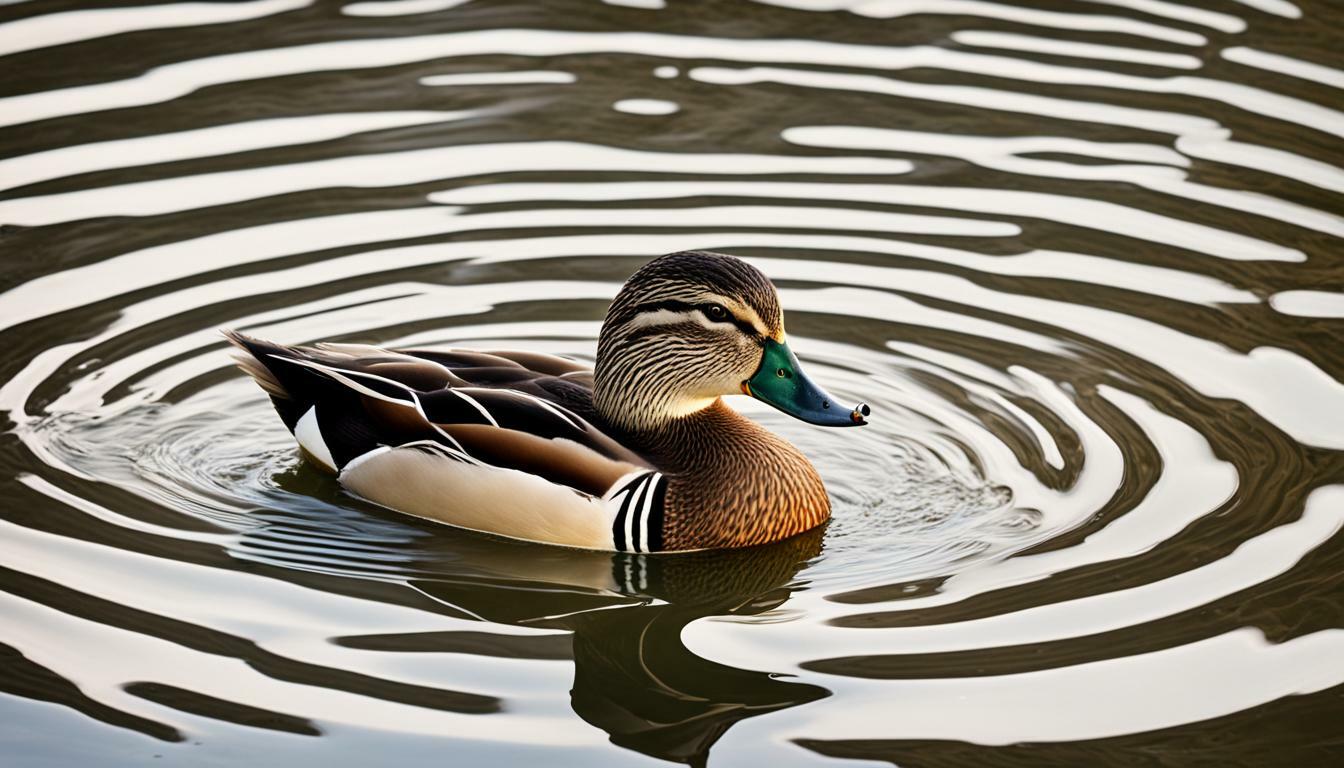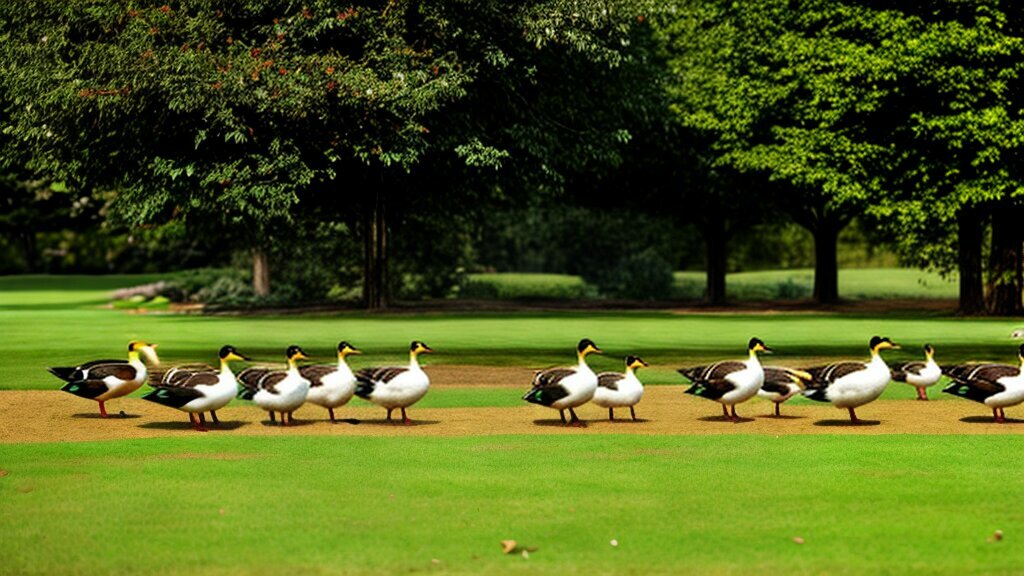Where Do Ducks Sleep? Unraveling Mysteries

Table of content:
Ducks are versatile when it comes to sleep. As waterfowl designed for an aquatic lifestyle, ducks have evolved to get their rest both in the water and on land. Their sleep postures and habits change depending on the season, temperature, and their age.
Wild ducks face predators and threats that impact where and how deeply they can sleep. Mother ducks must also protect their ducklings. Domestic ducks kept as pets or on farms have additional sleeping considerations as well.
Below, we’ll go through the most common google searches around duck sleeping habitats and explain what we know based on scientific research and experts’ observations. Understanding the unique sleep behaviors of ducks reveals a lot about their natural history and biology.
Where Do Wild Ducks Sleep at Night?
Wild ducks employ a variety of techniques to get enough rest at night while still protecting themselves. Their ability to sleep both on land and in the water gives them options.
Ducks generally do not fly at night. So as dusk approaches, wild ducks will seek out a safe spot to settle in for the night. Often, this means floating on the water or perching on branches above it.
Sleeping on Water
When sleeping on the water, ducks will tuck their beak into their back feathers. This helps conserve heat so they can withstand sleeping on the cold water. Ducks also have oils in their feathers that repel water, keeping their skin dry.
By sleeping together in a group, called a raft, ducks can better watch for predators and stay warm. Groups of ducks sleeping on the water is a common sight during migration or on winter habitats.
Dabbling duck species like mallards commonly perch or tip-up in the water to sleep. This allows them to float while keeping their head and neck out of the cold water.
Diving ducks like canvasbacks fully float on top of the water instead. Their feathers trap air to keep them buoyant. Being on the surface rather than the edges lets them quickly escape from predators.
Sleeping on Land
Ducks may also seek out sleeping spots on the ground or in trees, depending on the environment. Some species, like wood ducks, preferentially sleep in nests on the ground or in tree cavities at night.
Sleeping on land keeps ducks warmer and better hidden from predators like coyotes. But the ground leaves them vulnerable to other threats. So sleeping in trees or dense vegetation is safest.
Mother ducks with ducklings will also lead their babies out of the water to sleep on land. The ducklings cannot yet fully regulate their temperature and are vulnerable in the water at night.
Light Sleep and Vigilance
Regardless of where they sleep, ducks rarely enter deep sleep. They are vulnerable prey animals, so their sleep is light and easily disrupted.
Mother ducks especially remain alert with one eye open to watch for predators. They must protect their young while still getting enough rest to survive.
Ducks often change sleeping spots nightly. And sentinel ducks may stay awake to watch the flock or scan for threats. Their adaptations allow wild ducks to sleep safely in the wild.
Where Do Baby Ducks Sleep?
Baby ducklings have different sleep needs and behaviors than adult ducks. Their ideal sleeping habitats change as they mature.
Hatchlings
Newly hatched ducklings do not migrate or swim right away. For their first 1-2 days, ducklings stay close by their mother sleeping and resting.
Mother ducks create a well-insulated ground nest for their hatchlings to develop in. After hatching, she will lead them to spots on solid ground to sleep and warm up.
Hatchlings huddle together for warmth at night and during cooler weather. They also sleep longer to conserve energy, with their eyes closed most of the time.
Ducklings
Within 24 hours, ducklings grow waterproof feathers and begin swimming. At this stage, mother ducks will start taking their young into the water to find food by day.
But mother ducks still lead their ducklings back to land each night to sleep safely. Ducklings do not yet have the waterproofing, stamina, and fat stores to spend the night floating.
As they grow, ducklings continue sleeping on land at night. But they can withstand slightly cooler and damper spots, like in marsh vegetation.
Juveniles
By one month of age, young ducks have adult-like waterproof feathers and insulation. They can now float and sleep on open water alongside their mother and other adults at night.
Young ducks continue perfecting their preening technique to maintain their feathers. With practice, they can keep their feathers water-tight for sleeping in wet spots.
Mother ducks may still gather ducklings to sleep together for safety. But as they near flying age, ducklings can begin choosing their own sleeping spots just like adult ducks.
Where Do Domestic Ducks Sleep?
Domestic ducks raised on farms and as pets follow natural behaviors to find safe, warm places to sleep at night. Their keepers can also provide sleeping shelters.
Outdoor Housing
In outdoor enclosures, most domestic ducks will sleep on the ground or in provided houses. The ducks prefer sleeping spots that are:
- Dry and draught-free
- Insulated from the ground
- Defendable with good visibility
Sleeping tightly packed in groups helps the ducks stay warm. But they require enough space to all lay down comfortably.
Some pet ducks may choose to sleep on porches or in open dog houses versus enclosed coops. Owners can provide multiple sheltered sleeping areas so ducks can pick what suits them.
Indoor Housing
Ducks adopted as pets sometimes sleep indoors with their owners. These domestic ducks can easily grow attached to humans as their flock.
Indoor sleeping spots should be dog crate-sized and lined with absorbent bedding. This helps keep their surroundings clean overnight.
Some clues an indoor duck is sleeping comfortably include:
- Curling in a relaxed posture
- Nestling into bedding
- Keeping eyes closed and bill tucked in feathers
- Soft snoring sounds
With their needs met, indoor ducks will readily adapt to sleeping in bedrooms or other safe indoor areas at night.
Water Access
All ducks need water to preen and clean their feathers. So even indoor ducks should have a small pool or tub to dip into before settling in to sleep.
Access to water makes it possible for ducks to waterproof their feathers each day. Keeping their down dry and fluffy is crucial for trapping warmth while sleeping.
Ducks comfortable sleeping in or near water can choose to do so indoors as well. But providing dry, warm areas for sleeping is still essential.
Where Do Ducks Sleep in the Winter?
In winter, ducks rely on adaptations like fat stores and down insulation to survive freezing temperatures. Their ideal winter sleeping habitats help conserve warmth.
Water Sleeping
When sleeping on the water in winter, ducks float among ice chunks or in areas of open water. Clustering together in rafts allows them to combine body heat.
The circulating water also prevents the buildup of freezing ice on their feathers. Ducks will splash water onto their feathers before settling in to sleep. Staying damp helps their feathers hold in warmth.
Rocking with the water rather than being fully still likewise keeps ducks from freezing. Diving ducks can also choose to sleep underwater where the temperature is a constant 39°F.
Land Sleeping
During freezing weather, ducks strongly prefer sleeping on land. Nesting in insulated cavities or thick vegetation protects ducks from wind, snow, and icy ground.
Tree cavities, brush piles, and nest boxes give ducks dry, sheltered spots to sleep above the snow. South-facing slopes or structures out of the wind help prevent chilling.
Some duck species grow more down feathers for winter insulation. Keeping their feathers fully dry is important for trapped air pockets to insulate them against the cold.
Migration
Migrating ducks travel during the day and rest at night. Lakes, rivers, and wetlands along their migration path provide necessary sleeping habitats.
Ducks conserve energy during migration by sleeping more. Safe resting spots with plentiful food allow ducks to sleep deeply and rebuild fat consumed flying long distances.
Unfreezing water to sleep on is a challenge during winter migration. Lakes and rivers with open water provide essential safe sleeping areas for migrating ducks.
Do Ducks Sleep in Water or on Land?
Ducks are adapted to sleep both on water and on land. Their sleeping habitat tends to depends on:
- Temperature
- Safety from predators
- Life cycle period (migration, mating, etc.)
- Individual preference
Of the two, sleeping on land offers ducks greater safety, warmth, and ability to rest deeply. But sleeping on water provides quick escape from predators.
Ducks tend to sleep on land at night when safer and warmer. During the day, resting on water allows for quick detection of threats and escaping. Young ducklings sleep on land until they can fully waterproof their down.
Many duck species preferentially choose dense, sheltered areas on land to sleep when available. But they will still readily float and sleep on open water when safer land spots are lacking.
Their ability to sleep both on open water and tucked away on land lets ducks thrive in diverse wetland habitats. Ducks nest on land but are still fully at home on the water, even when sleeping.
Do Ducks Sleep Standing or Lying Down?
Ducks can sleep both while standing on land and lying on the water. Different sleep postures help ducks stay safe in each habitat.
Standing
When perching on branches or the ground, ducks will stand on one leg while sleeping. Tucking the other foot up into their feathers helps conserve warmth.
Standing to sleep lets ducks remain upright while resting. This allows for easy flight if startled. Muscles locking their leg joints allow a duck to stand fully still while their mind sleeps.
Ducks standing to sleep often tuck their beak into their wing feathers. This pointing backwards posture streamlines their silhouette and retains body heat.
Lying Down
While floating on water, ducks can fully relax and sleep lying down. With their buoyancy supporting their weight, ducks can lay with their neck flat and eyes closed.
Rafting ducks may either float belly up or rest their head on their back. This fully stretched out posture lets them sleep deeply while still drifting safely.
Lying flat helps ducks keep their full bodies and heads/necks submerged underwater while sleeping. Some ducks also lay on land while sleeping in dense vegetation.
Overall, ducks employ standing sleep when security is a concern and prone sleep when comfortably resting. Their adaptations allow for both as needed.
Do Ducks Sleep with Their Eyes Open?
Ducks can both close their eyes fully to sleep deeply and rest with eyes partially open to stay aware. Special adaptations help ducks safely sleep both ways.
Closed Eyes
In secure areas, ducks will close their eyes fully while sleeping, just like humans. Their nictitating membrane covers and protects the eye while allowing them to sleep deeply.
With eyes closed, ducks cannot see threats. So fully sleeping ducks rely on flock mates and mothers to alert them to danger. Closing their eyes maximizes their rest.
Sleeping with eyes fully shut tends to occur more on land and in sheltered spots where the ducks feel safest. It may also happen while floating in a large raft of ducks.
Half-Open Eyes
Ducks also employ unihemispheric slow-wave sleep, allowing half their brain to sleep while one eye and hemisphere stay alert.
By resting one eye against their back or shoulder while keeping the other partly open, ducks can monitor for predators while still sleeping. Their open eye will be the one facing away from their flock or ducklings to watch for threats.
This type of sleep still provides ducks with vital rest. But they can quickly wake their entire brain and body using the alert eye and brain hemisphere if disturbed. Mother ducks in particular sleep this way to watch for dangers.
Final Thoughts
Ducks have adapted in amazing ways to allow them to safely sleep both on land and in the water. Their versatility provides mother ducks and ducklings the warming, protective habitats they need while giving adults quick escape from threats.
Understanding how wild ducks sleep can help birders know where to search for them at night. And learning natural duck sleeping behaviors can assist anyone raising domestic ducks in providing proper housing.
A duck’s ability to close its eyes fully while secure or keep one eye open to scan for predators are just two of many adaptations that aid their survival. Watching a raft of ducks sleeping on a misty pond gives a glimpse into the behaviors that have allowed ducks to thrive worldwide.
Observing ducks in the wild, stories of rescued ducks bonding with caretakers, and simple curiosity about their lives has led to common questions around where and how these unique waterfowl rest. As research continues, we gain more insight into the sleeping ecology that is so integral to a duck’s daily rhythms and biology.
Welcome. I’m Adreena Shanum, the proud owner of this website, and I am incredibly passionate about animals, especially poultry. I founded adreenapets.com as a labor of love, stemming from my desire to share my knowledge and experiences with poultry enthusiasts worldwide.




